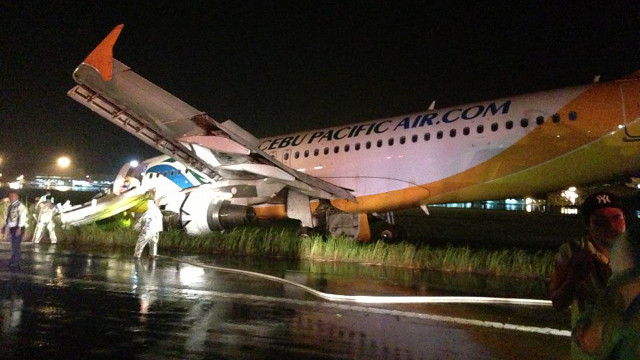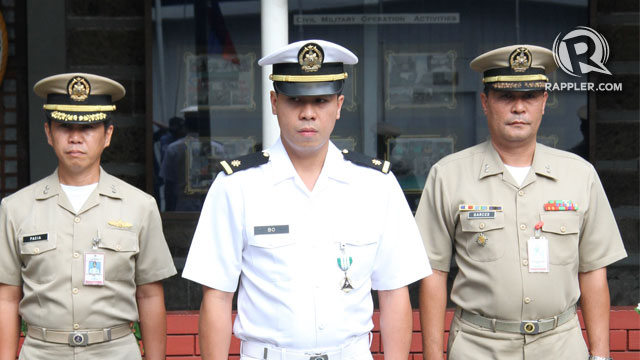SUMMARY
This is AI generated summarization, which may have errors. For context, always refer to the full article.

MANILA, Philippines – On June 2, a Cebu Pacific flight carrier skidded off the runway of the Davao International Airport. The plane – able to carry 180 passengers with 6 seats in a row – landed on its nose, had a broken wing, and was tilting sideways.
Rain poured that night as predicted by the weather bureau.
“There was still light in the 9th row, bright enough to see out of the window that smoke was coming out of the left wing,” recalled one passenger. He said he heard the “mechanical blast” from where he was sitting.
A passenger from the middle row, however, said it was already pitch-black. “Total darkness,” he recalled.
An actual footage of the scene inside the plane taken minutes after the errant landing corroborates this. Nothing is heard apart from indistinct, terrified ramblings.
Some say “smoke” and others say “the smell of fuel” overtook the plane’s interior. Passengers would attest later on that some among them were crying, including a 7-month-old baby.
‘Speak in English’
There were attempts from the airline crew to contain the crowd’s panic. Most of them were already rushing to get their hand-carry bags from the overhead compartment.
“Wait lang po. Antayin natin yung announcement from the pilot,” a flight stewardess was quoted to have said. (Please wait. Let us wait for the announcement from the pilot.)
She forgot to use a megaphone in addressing the plane’s 165 passengers and also forgot there was a foreigner in the crowd.
“Please speak in English,” the foreigner requested.
Bo steps in
Navy reservist Marlon Bo asked the pilot what the plan was, but he didn’t get a straight answer. That was the time he knew he had to step in.
(READ: CebuPac broke SOP to ‘evacuate passengers immediately’?)
The 31-year-old shipping consultant introduced himself as “Lieutenant Bo of the Philippine Navy” and asked if there were doctors, nurses, or soldiers in the plane who can help.
“Nung moment na yun (At that moment), to tell you frankly, I was also afraid,” Marlon would later on recall in an interview. “Totoo yung sinasabi sa Navy (What they say in the Navy is true): Courage is not the absence of fear but the ability to control it.”
On June 14, Bo was awarded by the Philippine Navy at the Navy Reserve Command in Intramuros where he works every Saturday as a reservist.
“I wasn’t even on active duty, but I had to establish my authority for them to calm down,” he said, explaining why he introduced himself as Lieutenant when he wouldn’t do so in normal circumstances.

Funny moments
Mistaking him as the pilot and not hearing clearly what his name was, the passengers called Marlon “Captain Bok.” He didn’t mind and never corrected it even after the incident.
One of the passengers remembers Marlon’s voice distinctly. “Relaks lang po kayo. Alam po nila ginagawa nila,” the passenger quoted him. (Just relax. They know what they’re doing.)
At that moment, it made all the difference.
Nino Alinsub, who wrote a detailed account of his experience, called Marlon a “guiding voice.”
There are times, Bo said, when you look back and laugh at certain moments during the incident.
Many times throughout the ordeal, he referred to the plane as “barko” (ship) — “Huwag po tayong magkagulo dito sa barko” — because his training in crisis management mainly involved ships. (Let’s not panic here in the ship.)
There was also the time a passenger told him he couldn’t take off his belt. “Sir, malalaglagan na po ako kapag wala yung belt!” the passenger said, when Bo asked everyone to take off any metallic thing they were wearing before exiting through the emergency slide. (“Sir, my pants will fall without the belt!”)
“But you can only laugh looking back,” Bo said. “We really thought we were going to die.”
Bonds formed, lives altered
Bo made it clear that he was not the hero of the story, and that they all helped each other.
“We worked together to get out alive,” he said, explaining how they disembarked peacefully with women and children first leaving the plane.
There was a 28-year-old law student, looking forward to spending time with his family in Davao after vacationing for a month in Cebu and Palawan. There was a couple with their 5-year-old son, a businesswoman, a lawyer, the foreigner who asked the stewardess to “speak in English,” and his secretary.
In the days following the plane mishap, they became each other’s listening friend.
One of them said there are times when other people – even their own family members – “don’t understand.” “They weren’t there,” a passenger who requested anonymity said.
Bo would pause from time to time during the interview and look away, as if remembering what happened. He said he struggled to sleep and go back to his normal routine despite his training in crisis management. “How much more the others?” he asked.
Four days after the incident, another passenger was rushed to the hospital as his blood pressure shot up. “Anxiety and lack of sleep,” he told Rappler.
There are also those of them who refused to be interviewed. “I can’t [accommodate an interview] now. We are in the hospital. My baby is confined,” her text message read in Filipino.
Post-traumatic stress
Psychiatrist Elizabeth Rondain said inability to sleep, outbursts of anger, recurrent recollection of the event, nightmares, and difficulty in adapting to daily routine are symptoms of acute stress disorder. If the symptoms last for a month, they indicate a graver problem, post-tramautic stress disorder.
In an interview, Rondain said people get it when they are suddenly exposed to “severe stress” that involves a threat to their life.
She urged family members to be supportive of patients undergoing acute stress disorder, as they need a strong support system and a safe environment.
“Makinig lang sila, kahit paulit-ulit (They should listen, even if it’s just the same story being told). These patients really need to verbalize,” she explained.
Symptoms, she added, could last days and months after the trauma or even 10 to 30 years after.
For Bo, this is his second life. Suddenly, he said, there is a sense of urgency to do the things he had always wanted to do.
“It will never be the same,” he said, looking at his wife Rosanne. “The knowledge that life is uncertain changes a man.” – Rappler.com
Add a comment
How does this make you feel?
There are no comments yet. Add your comment to start the conversation.